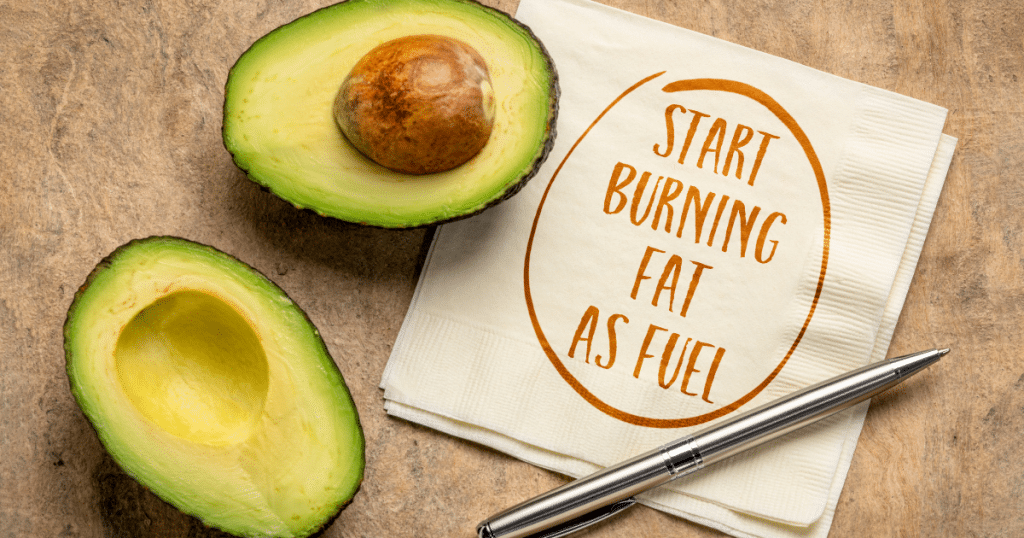Keto Diet: Proper Meal Planning Equals Success
Are you a keto diet beginner who’s looking to explore the world of ketogenic eating and experience its potential weight loss benefits? In that case, you’ve come to the right place! In this guide, we unpack some of its mysteries and equip you with the knowledge to start keto right and ensure it is lasting and transformative.
The keto diet has gained significant popularity in recent years, captivating the attention of individuals seeking weight loss, increased energy levels, and improved overall health. But what exactly is the keto diet, and how does it work?
Table of Contents
ToggleWhat Is a Keto Diet
Keto is a low-carbohydrate, high-fat eating plan that encourages the body to enter ketosis. During ketosis, your body shifts from relying on carbohydrates for fuel to burning stored fat as its primary energy source. Initially prescribed for people with epilepsy, it was discovered that this metabolic adaptation can lead to some very beneficial changes in your body and well-being.
We look at some of the fundamental principles of the keto diet, shedding light on why it has garnered such enthusiasm from its followers. Some key benefits of keto include weight loss without starvation, increased energy levels, enhanced mental clarity, and potential health improvements regarding high blood pressure and diabetes.
Below are insights into food choices and meal planning and some practical tips to help you navigate the challenges that may arise along the way.
Before you proceed, we must emphasize the importance of consulting a healthcare professional before taking on any new dietary regimen. They can provide personalized advice and ensure that the keto diet aligns with your individual needs and health goals and whether it is suitable for you at this time or not.
(Read Full Disclaimer: Here)

Why You Should Consider a Keto Diet
The keto (or ketogenic) diet is more than a passing trend. It is a scientifically backed approach to eating that has gained recognition for its potential benefits. To truly grasp the power of the keto diet, we must understand its core principles and explain how it works.
At its essence, the keto diet aims to shift your body’s metabolism from relying primarily on carbohydrates to utilizing fat as its primary energy source. This metabolic switch occurs through a process called ketosis.
Following a well-formulated keto diet drastically reduces your carbohydrate intake, typically around 5-10% of your daily calorie intake. Meanwhile, the consumption of healthy fats increases, accounting for approximately 70-75% of your calories, with the remaining calories coming from moderate protein intake.
By restricting carbohydrates, your body enters a state of ketosis, producing molecules called ketones (in your liver) from stored fat. These ketones then become the primary fuel source for your body and brain. This shift offers a range of benefits that go beyond weight loss.
One of the key advantages of the keto diet is its potential for effective weight management. Keto diets give you more room and flexibility to adapt the diet plan to your needs. In contrast, other dieting methods specify only a defined list of foods. With keto, you can mix and match to your taste to a greater degree, provided you stick to the basics. So you can go at your own pace (and pocket) to achieve your weight goals.
Moreover, the keto diet has demonstrated potential benefits for various health conditions. However, to achieve these benefits, it is critical to start a keto diet for beginners with a proper meal plan; this is one area where keto starters often struggle and give up. Fear not, for we have you covered; more on this later.
Understanding the principles of the keto diet is essential. Still, it’s also important to note that everyone’s experience with the diet can vary. Listening to your body and adjusting your diet to meet your needs and goals is vital.
Key Benefits of Keto
As summarized above, the keto diet has gained significant attention for its potential benefits beyond weight loss. Adopting a low-carb, high-fat eating approach may have a range of positive effects on health and well-being. Listed are some key advantages.

Keto Is Restrictive, But Effective
One of the primary reasons people turn to the keto diet is its effectiveness in weight management. By restricting carbohydrates and transitioning to a state of ketosis, your body becomes efficient at burning stored fat for energy. Your insulin levels decrease, promoting fat burning, which can lead to significant weight loss. Additionally, the increased consumption of healthy fats on the keto diet helps you feel more satiated, reducing cravings and aiding in calorie control. Done correctly, it can lead to some great results.
Improved Cognitive Function
The keto diet is often associated with improved cognitive function and mental focus. When ketones fuel your brain, it can experience enhanced clarity and concentration, making it an appealing dietary approach for those seeking increased productivity and cognitive performance.
Helps Control Cravings
Consuming healthy fats and reducing carbohydrate intake on the keto diet can help regulate appetite and reduce cravings. Fats promote satiety, keeping you fuller for extended periods and potentially aiding calorie control. This approach can be an excellent tool for sustainably breaking old eating habits.
Potential Benefits for Type 2 Diabetes, Cardiovascular Health & Inflammation
Research suggests that for individuals with type 2 diabetes, prediabetes, or insulin resistance, the keto diet may offer benefits in managing blood sugar levels. By minimizing carbohydrate intake, the diet can lead to reduced insulin spikes and improved insulin sensitivity, potentially helping stabilize blood sugar levels.
Emerging research suggests that the keto diet positively affects cardiovascular health. It has been linked to improved triglyceride levels, increased HDL (good) cholesterol, and decreased LDL (bad) cholesterol levels. However, to ensure overall heart health, it’s essential to maintain a balance of healthy fats and choose quality sources.
Chronic inflammation contributes to various health conditions. Some studies suggest that the keto diet helps reduce inflammation, which can positively affect overall health and alleviate symptoms associated with inflammation.
Meal Planning is Critical For Success
As highlighted earlier, though, not everyone may experience the same keto journey or benefits. For some, it could take longer, while others may see results sooner. Similar to most things in life, consistency and time are essential.
Starting a keto diet for beginners can be exciting but also overwhelming. When starting keto, laying a solid foundation and understanding the key steps is vital to ensure a smooth transition. Also, one must consider the importance of having a proper meal prep plan.
If you’d like to try a fully tailored keto plan to help you get started and save time and effort, check out this ‘Keto Diet Planner.’ Answer a quick quiz about your current status and requirements and get a fully customized meal schedule just for your specific needs.

Educate Yourself On Keto
Before diving straight into the keto diet, take the time to educate yourself about its principles, food choices, and potential challenges (you’re already reading this, so that’s a solid first step). Understanding the basics will help you make informed decisions and set realistic expectations.
The most important piece of knowledge, though, might be understanding yourself, particularly your own body. You know yourself best, so know your mental and physical limitations. Asking the right questions early about yourself will go a long way.
Understand Keto Macros
Macronutrients, or macros, refer to the three main components of your diet: fats, proteins, and carbohydrates. Calculate your personalized macronutrient ratios based on your goals and activity level. A standard keto diet typically comprises approximately 70-75% fat, 20-25% protein, and 5-10% carbohydrates. Generally, the fewer carbs that make up the menu, the better and earlier you enter ketosis. However, it would help if you still had enough to give your body sufficient fiber.
Remove high-carbohydrate and processed foods from your pantry and refrigerator to eliminate temptations. Stock up on keto-friendly foods, such as healthy fats (e.g., avocados, olive oil), quality proteins (e.g., lean meats, fish), low-carb vegetables (e.g., leafy greens, broccoli), and keto-approved snacks. Again, this is where your planning will shine. Take stock of the meal plan and your budget to help you establish a routine quickly.

Create a Weekly Plan
Meal planning is critical to staying on track with the keto diet. Create a weekly meal plan that includes a variety of nutrient-dense, low-carb meals and snacks. Incorporate balanced fats, proteins, and vegetables into each meal to meet your macronutrient targets. Include keto-friendly favorites and try to rotate enough into the weekly plan.
You can plan more than a week if needed. However, you must adjust your schedule around cooking, preparing, and eating. People often find this a way to try new recipes and develop new tastes they may not have experienced.
Maintain Proper Hydration
Proper hydration is crucial in the keto diet. Increase your water intake to support your body’s transition into ketosis and help flush out toxins. Aim for at least 8 cups of water daily, and consider adding electrolytes to your water to maintain proper balance. Although you can have teas and coffees (with a moderate amount of milk and no sugar), it might be better to minimize these as they can have a dehydrating effect.
Track Your Progress
Getting feedback on your progress is a good idea to ensure you’re in ketosis. You can monitor your ketone levels using urine strips, blood ketone meters, or breath ketone analyzers. Doing this will give you valuable indicators of whether you’re effectively following the keto diet and reaching your goals.
Beware of Hidden Carb Traps
Carbohydrates like condiments, sauces, and processed foods can hide in unexpected places. Read food labels carefully and opt for whole, unprocessed foods whenever possible to minimize hidden carb intake. Getting kicked out of ‘ketosis’ will hamper your progress this way.
Don’t Tackle it Alone
Surround yourself with a supportive community or enlist an accountability partner. Having someone to share your keto journey with can provide motivation, encouragement, and helpful tips.
Simply getting in the mindset for a keto diet for beginners can sometimes be the most challenging part, so a social structure around your weight loss journey is always a great idea! Join groups, communities, and even friends if they are on the same path as you to make it more fun.
While the keto diet restricts carbohydrates, it’s crucial to maintain a diverse and nutrient-dense eating plan. Include a wide range of colorful vegetables, healthy fats, and quality proteins to ensure you get a broad spectrum of essential nutrients.
Everyone’s experience with the keto diet is unique. Pay attention to how your body responds and adjust your approach accordingly. Consult a healthcare professional for guidance if you experience any adverse effects or have concerns.
Consider our Recommended Keto Planner if you’d like to get a head start and a helping hand with getting the right done-for-you plan for your specific needs.
Common Challenges On The Keto Diet
While the keto diet offers numerous benefits, it’s essential to be aware of potential challenges and side effects that some individuals may experience. By understanding these challenges and knowing how to overcome them, you can navigate your keto goals more effectively. Here are some common challenges and strategies to overcome them when starting a keto diet for beginners:

Keto Flu
One of the more common initial side effects of starting a keto plan is what’s known as ‘Keto Flu.’ Many individuals experience flu-like symptoms during the initial stages of transitioning into ketosis.
This is similar to withdrawal or the first few days of fasting. Symptoms may include fatigue, headache, brain fog, and irritability as your body undergoes the changes and adaptations it needs to begin ketosis.
These symptoms are entirely normal when starting any keto diet for beginners. To overcome keto flu, ensure you’re well-hydrated, consume enough electrolytes (sodium, potassium, magnesium), and gradually reduce carbohydrate intake to allow your body to adapt.
Hunger Cravings
Restricting carbohydrates can initially lead to cravings and increased hunger. Consume sufficient healthy fats and proteins to manage cravings, which provide satiety and help curb appetite. Incorporate plenty of non-starchy vegetables into your meals, as they are low in carbohydrates but high in fiber, aiding in fullness.
Also, check if your specific plan allows for more frequent but smaller meals, which can help avoid feeling hungry as often.
Challenges Eating Out
Following the keto diet for beginners can be challenging in social situations, such as dining out or at parties. To overcome this, plan by researching keto-friendly options at restaurants or suggesting keto-friendly meal ideas to friends and family when attending social gatherings. If necessary, bring your keto-friendly dish to share. Let those around you know in advance about your regimen.
Increased Planning and Vigilance
The keto diet requires more planning and preparation compared to other diet regimes. Overcome this challenge by dedicating weekly time to meal planning, grocery shopping, and meal prepping.
This way, you’ll have keto-friendly meals readily available and reduce the likelihood of reaching for non-compliant foods out of convenience. As mentioned, this is a vital component of a keto diet for beginners; this step defines most people’s keto success, so ensure you are mentally prepared for this, too.
Digestive Issues
Some individuals may experience digestive issues, such as constipation, when starting the keto diet. Increase your fiber intake by incorporating low-carb, fiber-rich foods like avocados, chia seeds, and leafy greens into your meals. Additionally, staying well-hydrated and ensuring you have enough healthy fats can help promote regular bowel movements.
While trying new recipes is fun, it also exposes your body to ingredients it may not be used to, which could take time to adjust.
Vitamin & Mineral Deficiencies
While rare, eliminating certain food groups from your diet can increase the risk of nutrient deficiencies.
Focus on consuming various nutrient-dense foods, including low-carb vegetables, quality proteins, and healthy fats. Plan your meals around obtaining enough essential vitamins and minerals.
Consider consulting with a registered dietitian or healthcare professional to ensure you’re meeting your nutrient needs.
Progress Plateau
While the keto diet is known for its weight loss benefits, some individuals may experience a plateau or slower weight loss over time. This is often due to misaligned nutrient proportions.
To overcome this, reassess your macronutrient intake, track your food intake diligently, and consider incorporating intermittent fasting or adjusting your caloric consumption. Regular exercise or even something as simple as altering meal times can help you get back on track.
Finally, remember to track your ketosis via the methods mentioned earlier and act on feedback early.
Maintaining a long-term keto lifestyle can be challenging for some individuals. Finding a balance that works for you and considering incorporating cyclical or targeted keto approaches is essential. Gradually reintroducing healthy carbohydrates in controlled amounts may also be an option for some individuals. Keto is also about mind over matter, so keep your focus and determination up. Use your favorite tried and tested methods to stay motivated and inspired, whether looking forward to a beach vacation or listening to your favorite music!
Keto Best Practices
A keto diet is as much about short-term results as it is about adopting a sustainable lifestyle that promotes overall health and well-being. To help you achieve long-term success as a new starter on the keto diet for beginners, consider the following tips:

Stay Consistent and Positive
Consistency is key when following the keto diet. Stick to your chosen macronutrient ratios and ensure your meals are predominantly healthy fats, moderate proteins, and low-carb vegetables. Avoid frequent deviations or “cheat days” that can hinder your progress. It is common to see significant life events and decisions derail an otherwise successful keto journey. While you may not be able to do much about that, it is good to keep mental positivity and focus to get back on track much quicker.
Plan Ahead For A Smooth Ride
Plan your meals and prepare keto-friendly options to avoid impulsive food choices. Set aside time each week for meal prepping and batch cooking. Doing so will save time and make sticking to your keto diet easier, especially during busy days.
As stressed throughout, this method is your number one tool to ensure a great start and result! Make it easy on yourself by using the keto planner.
Right Food Choices
Prioritize whole, nutrient-dense foods while avoiding processed and packaged products. Opt for grass-fed meats, wild-caught fish, organic eggs, non-starchy above-ground vegetables, healthy oils, nuts, and seeds. These choices support ketosis and provide essential vitamins, minerals, and antioxidants.
Track Your Macros (Use An App)
Pay attention to your macronutrient intake, which should be a big part of your weekly meal plans. Use reliable apps or tools to track your daily carbohydrate, protein, and fat consumption. This awareness will help you maintain the appropriate ratios and adjust your intake for your goals.
Exercise Is A Free Mega Boost
Physical activity complements the keto diet by promoting overall health, enhancing weight loss, and maintaining muscle mass. Engage in aerobic exercises, strength training, and flexibility exercises that align with your fitness level and goals.
For many people, exercise helps overcome plateau situations, particularly if they do not see much change. The diet plus exercise combo is a tried-and-tested formula, so you will only win with this.
Keep Adequately Hydrated
Drinking enough water is crucial to the keto diet. Aim for adequate hydration by consuming water throughout the day. Consider adding electrolytes to your water or incorporating herbal teas for variety and additional hydration support while minimizing black teas and coffees. Good hydration combats the adverse effects of keto flu and will prevent headaches and crashes.
These Fats Are Your Best Friend
Focus on consuming high-quality, healthy fats such as avocados, olive oil, coconut oil, nuts, and seeds. These fats provide satiety, support ketosis, and offer various health benefits. Be mindful of portion sizes to maintain calorie balance.
Have Support At Hand
Surround yourself with a supportive community, whether it’s through online forums, social media groups, or local meetups. Share your challenges, successes, and recipes with others who follow the keto lifestyle. Having a support system can provide motivation and help you stay on track.
Monitor Progress
Monitor your progress and regularly reassess your goals. Periodically evaluate your macronutrient intake, energy levels, and overall well-being. You can also test for your ketone levels at home with over-the-counter kits. Adjust your approach as needed to ensure it remains sustainable and aligned with your needs.
Understand Your Body and Adapt
Everyone is unique; what works for others may not work for you. Pay attention to how your body responds to different foods, exercise routines, and lifestyle choices. Trust your intuition and make adjustments accordingly.
Remember, the keto diet is not a one-size-fits-all approach. Personalizing your journey and finding the balance that works best for your body and lifestyle is essential. It’s a good idea to consult your health practitioner or an expert so they can help you better align your goals according to your health status. This way, you start a keto diet for beginners, knowing your limitations better.
Also, remember that although effective, keto is a diet approach that still adheres to the same basic principle of calorific deficit as most other diet programs. So ensure you spend more than you consume!
By implementing these tips and staying committed to your goals, you’ll be on the path to long-term success and optimal health with the keto diet. Good luck!
Click HERE to start by answering a quick 45-second quiz and be on your way to complete keto freedom.




